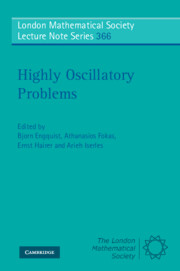Book contents
- Frontmatter
- Contents
- Preface
- 1 Oscillations over long times in numerical Hamiltonian systems
- 2 Highly oscillatory quadrature
- 3 Rapid function approximation by modified Fourier series
- 4 Approximation of high frequency wave propagation problems
- 5 Wavelet-based numerical homogenization
- 6 Plane wave methods for approximating the time harmonic wave equation
- 7 Boundary integral methods in high frequency scattering
- 8 Novel analytical and numerical methods for elliptic boundary value problems
6 - Plane wave methods for approximating the time harmonic wave equation
Published online by Cambridge University Press: 07 September 2011
- Frontmatter
- Contents
- Preface
- 1 Oscillations over long times in numerical Hamiltonian systems
- 2 Highly oscillatory quadrature
- 3 Rapid function approximation by modified Fourier series
- 4 Approximation of high frequency wave propagation problems
- 5 Wavelet-based numerical homogenization
- 6 Plane wave methods for approximating the time harmonic wave equation
- 7 Boundary integral methods in high frequency scattering
- 8 Novel analytical and numerical methods for elliptic boundary value problems
Summary
Abstract
In this paper we shall discuss plane wave methods for approximating the time-harmonic wave equation paying particular attention to the Ultra Weak Variational Formulation (UWVF). This method is essentially a Discontinuous Galerkin (DG) method in which the approximating functions are special traces of solutions of the underlying Helmholtz equation. We summarize the known error analysis for this method, as well as recent attempts to improve the conditioning of the resulting linear system. There are several refinement strategies that can be used to improve the accuracy of the computed solution: h-refinement in which the mesh is refined with a fixed number of basis functions per element, the p-version in which the number of approximating functions per element is increased with a fixed mesh, and a combined hp strategy. We shall provide some numerical results on h and p convergence showing how methods of this type can sometimes provide an efficient solver.
Introduction
Traditional methods for discretizing the Helmholtz equation based on using the equation directly suffer from the problem that they become rapidly more expensive as the wave number k (see Eq. (1.1)) increases. For example, finite element, finite difference, finite volume and discontinuous Galerkin methods all suffer from “pollution error” due to the fact that discrete waves have a slightly different wavelength than their exact counterparts (since this error in the wavelength depends on the wave number k, this leads to the “dispersion” of a wave).
- Type
- Chapter
- Information
- Highly Oscillatory Problems , pp. 127 - 153Publisher: Cambridge University PressPrint publication year: 2009
- 2
- Cited by

